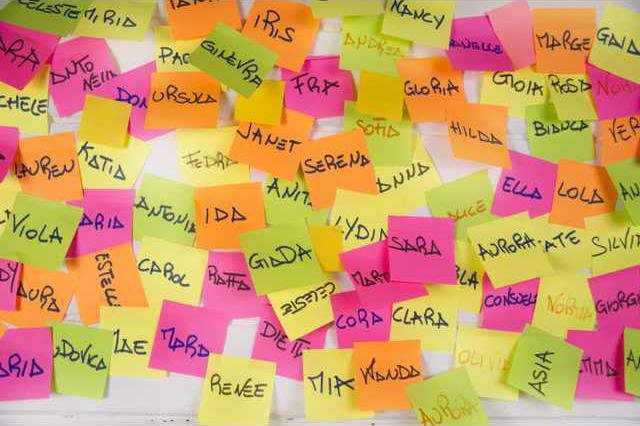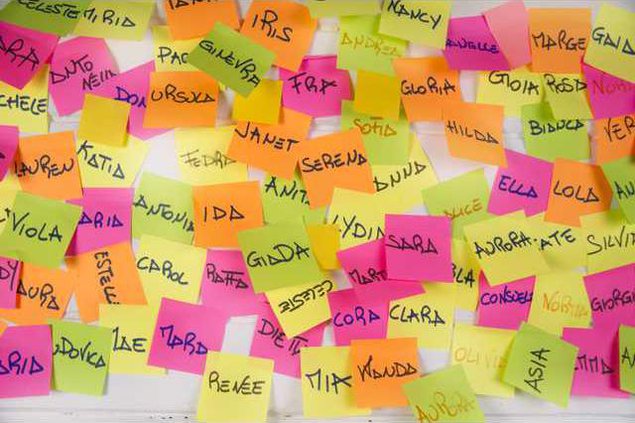Noah and Emma were the most popular baby names in America in 2016, according to the Social Security Administration's annual reckoning. Noah has topped the list of boy names since 2013, while Emma held on to its No. 1 spot since she bested Sophia in 2014 for girl names.
The boy names rounding out the top five are William, Liam, Mason and James. The other top names for girls are Olivia, Ava, Sophia and Isabella.
The Social Security Administration has published the list since 1997, when actuary Michael W. Shackleford compiled the first list. But the agency's popular names lists going back several decades are available.
Mapping the most popular name for each state shows some interesting patterns. Ava plays big in the south, for example, while Mia's the main moniker for girls in California, Nevada and New Mexico. Oliver and Liam are at the top in scattered states, while William is primarily popular in the South.
Utah has one of the really striking top name pairings: For boys, Oliver. For girls, Olivia. It would certainly simplify naming boy-girl twins.
There are a lot of different ways to play the name game and the Social Security Administration offers several of them, including a list of the "most improved" names, which are those that jumped the most in popularity between 2015 and 2016. Kylo moved from No. 3269 to No. 901 the biggest leap among boys. For girls, the biggest surge in popularity was for Kehlani, from No. 3359 to No. 872. Royalty and Creed made similar but less dramatic leaps.
Jonael lost the most ground, while Caitlin and three other variations of the name were the top four for losing popularity among girl names.
In explaining the rankings, the administration notes that "different spellings of similar names are not combined. For example, the names Caitlin, Caitlyn, Kaitlin, Kaitlyn, Kaitlynn, Katelyn, and Katelynn are considered separate names and each has its own rank." None of them made the top 20.
Solid, time-tested names on the girls' top 20 list include Abigail (No. 7), Emily (8), Charlotte (9), Elizabeth (13), Evelyn (15), Grace (19) and Victoria (20). The more traditional names on boys' list were Jacob (4), William (5), Ethan (6), James (7), Alexander (8), Michael (9) and Benjamin (10). Daniel (12), Matthew (15) and David (18) remained in the top 20.
A number of names haven't budged, including Hezekiah, which sat steady at 677 for boys, while Rivka stayed No. 860 for girls.
The boy names rounding out the top five are William, Liam, Mason and James. The other top names for girls are Olivia, Ava, Sophia and Isabella.
The Social Security Administration has published the list since 1997, when actuary Michael W. Shackleford compiled the first list. But the agency's popular names lists going back several decades are available.
Mapping the most popular name for each state shows some interesting patterns. Ava plays big in the south, for example, while Mia's the main moniker for girls in California, Nevada and New Mexico. Oliver and Liam are at the top in scattered states, while William is primarily popular in the South.
Utah has one of the really striking top name pairings: For boys, Oliver. For girls, Olivia. It would certainly simplify naming boy-girl twins.
There are a lot of different ways to play the name game and the Social Security Administration offers several of them, including a list of the "most improved" names, which are those that jumped the most in popularity between 2015 and 2016. Kylo moved from No. 3269 to No. 901 the biggest leap among boys. For girls, the biggest surge in popularity was for Kehlani, from No. 3359 to No. 872. Royalty and Creed made similar but less dramatic leaps.
Jonael lost the most ground, while Caitlin and three other variations of the name were the top four for losing popularity among girl names.
In explaining the rankings, the administration notes that "different spellings of similar names are not combined. For example, the names Caitlin, Caitlyn, Kaitlin, Kaitlyn, Kaitlynn, Katelyn, and Katelynn are considered separate names and each has its own rank." None of them made the top 20.
Solid, time-tested names on the girls' top 20 list include Abigail (No. 7), Emily (8), Charlotte (9), Elizabeth (13), Evelyn (15), Grace (19) and Victoria (20). The more traditional names on boys' list were Jacob (4), William (5), Ethan (6), James (7), Alexander (8), Michael (9) and Benjamin (10). Daniel (12), Matthew (15) and David (18) remained in the top 20.
A number of names haven't budged, including Hezekiah, which sat steady at 677 for boys, while Rivka stayed No. 860 for girls.








